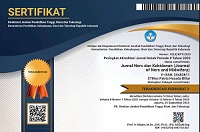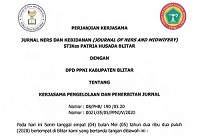Tiga Faktor Dominan Penyebab Kegagalan Toilet Training pada Anak Usia 4-6 Tahun
DOI:
https://doi.org/10.26699/jnk.v2i2.ART.p188-192Keywords:
The Factors That Affect the Failure of Toilet Training, Toilet TrainingAbstract
Toilet training in children is an attempt to train children to be able to control in conduct urinating or defecating. There are many factors that might could affect toilet training in children aged 4-6 years. This study aims to determine the main factors that affect the failure of toilet training in children aged 4-6 years. This research is a descriptive explorative study, with the population are all parents / trustee who have children aged 4-6 years and which stayed or recorded at RW(citizens association) 05 Pujiharjo Village Tirtoyudo Subdistrict Malang Regency a number of 55 respondents, data collection using interviews method. Result of the research showed that the biggest factor that affect the failure of toilet training was the mistake in teaching toilet training by 94,5%, inappropriate parenting by 91%, unprepared emotional chidren by 61,8%. The result might happen because the way or uncorrect method of toilet training, resulting in children less understand the importance of urinating and defecating in the bathroom, how to do it and do not follow the stages consistenly, so that the child fails in doing toilet training. The research suggestion for health care at Pujiharto Village to provide counseling to parents about toilet training.
References
Alexandra, Vermandel. 2008. Toilet training of Healthy Young Toddlers: Randomized Trial Between a Daytime Wetting Alarm and Timed Potty Training. Journal of Develop-mental & Behavioral Pediatrics, 29(3): 191-196.
Blum, N. J.,dkk. 2003. Relationship Between Age at Initiation of Toilet training and duration of Training. A prospective study of Pedtries.
Ekanuru.l (2012). Hubungan Pengetahuan, Sikap Dengan Praktek Ibu Dalam Toilet training Pada Balita Diperumahan Kini Jaya Kelurahan Kedungmundu Kecamatan Tembalang Semaran. Diunduh tanggal 03 oktober 2012 jam 12:48:30 pm
Hidayat, Aziz Alimul. 2005. Pengantar Ilmu Keperawatan Anak. Jakarta: Salemba Medika
Jayanti, D & Pratiti, B. 2009. Perbedaan Pola Asuh Ibu terhadap Kemandirian Toilet training di desa (PAUD Aisyiyah Cabang Kasihan Bantul) dengan Kemandirian Toilet training di Kota (Playgroup Nur Aini) Yogyakart. Skripsi Universitas Muhammadiyah Yogyakarta.
Kartini, 2013 faktor-faktor yang mempengaruhi ibu dlam mengaplikasikan kesiapan pada anak usia 2-4 tahun di desa miruk kecamatan krueng barona jaya kabupaten Aceh Besar.http://180.241.122.205/doc%20jurnal%20/%20 MAULI KARTINI%20%09.diakses pada tanggal 21 oktober 2013 jam 11:24:42
Keen, Deb. 2007. Toilet training for Children with Autism: The Effects of Video Modeling. Journal of Developmental and Physical Disabilities, 19(4): 291- 303.
Klijn, Aart J. 2006. Home Uroflowmetry Biofeedback in Behavioral Training for Dysfunctional Voiding in School-AgeChildren:A Randomized Controlled Study. The Journal of Urology, 175(6): 2263–2268.
Ustari. 2006. Efektifitas Pola Asuh Orang Tua terhadap Keberhasilan Toilet training pada Anak Usia Prasekolah (4-6 tahun) di TK Wahid Hasyim Malang. Skripsi Universitas Muhammadiyah Malang.
Warner, P&Paula, K. 2007. Mengajari Anak Pergi ke Toilet. Jakarta : Arcan
Wald, Ellen R. 2009. Bowel Habits and Toilet training in a Diverse Population of Children. Journal of Pediatric Gastroenterology & Nutrition, 48(3): 294–298.






